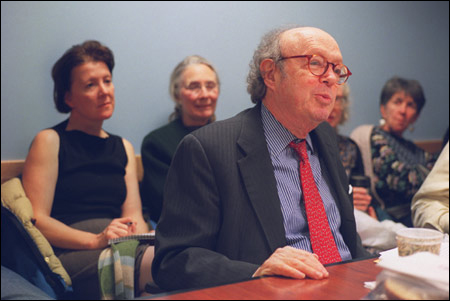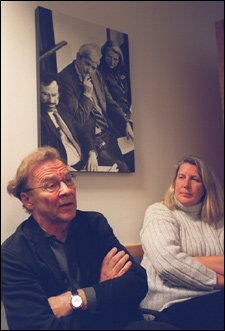Lewis sees threat to civil liberties
Pulitzer Prize winning journalist blasts Bush administration on Guantanamo detainment

If José Padilla can be held incommunicado in a U.S. Navy brig, without being charged, without the prospect of a trial, and without access to legal counsel, then none of us is safe.
This was the claim of a talk Oct. 23 by journalist Anthony Lewis at the Kennedy School’s Joan Shorenstein Center on the Press, Politics and Public Policy. “My sermon” is how Lewis half-humorously referred to the presentation.
Lewis is well qualified to sermonize on the subject of civil liberties. A columnist for The New York Times from 1969 to 2001, he has covered the Supreme Court, the Justice Department, and other legal matters, including the government’s handling of the civil rights movement. He has won the Pulitzer Prize twice, in 1955 for a series of articles on the dismissal of a Navy employee as a security risk, and in 1963 for his coverage of the Supreme Court. He has also taught at Harvard Law School and the Kennedy School.

“The most shocking thing about this,” said Lewis, “is that President Bush can detain any American citizen indefinitely in solitary confinement, without a lawyer and without a charge, simply by declaring him an enemy combatant.”
Whatever else may be said of Padilla, it is beyond dispute that he is a U.S. citizen. Born in Brooklyn, he grew up in Chicago, where he joined a gang named the Latin Disciples and at the age of 14 went to juvenile detention for a robbery in which a man was beaten to death. A repeat offender, he served time for a succession of crimes. Then in 1994 he converted to Islam after a prison spell in Florida.
According to federal officials, Padilla left the country in 1998 and went to Egypt, ostensibly to learn Arabic. From there he moved to Pakistan, seeking out more radical Islamist groups. In 2001, he obtained an interview with Abu Zubayda, Osama bin Laden’s chief of operations, and declared his willingness to explode a nuclear device in the United States.
Abu Zubayda was captured in March 2002 and under interrogation revealed Padilla’s connection with al-Qaeda. FBI officials tracked down Padilla and apprehended him on May 8 when he landed in O’Hare Airport in Chicago. He was served with a warrant as a material witness in the investigation of the 9/11 attacks and assigned a court-appointed lawyer.
Padilla’s court hearing was scheduled for June 11. On June 10, Attorney General John Ashcroft interrupted a visit to Moscow to announce that Padilla had been incarcerated in a military jail after federal officials learned that he had returned to the United States to explode a “dirty bomb.”
Ashcroft’s announcement placed Padilla squarely in the media spotlight, even though federal officials admitted he had no bomb-making equipment, plans, or even a target. Time Magazine named the gang member turned Islamic extremist its Person of the Week, “for incarnating the sum of our fears.”
When Padilla’s lawyer, Donna Newman, appealed to a federal judge, she was told that the government had the right to act as it did based on the president’s status as commander-in-chief of the armed forces and the fact that the nation was at war. He did rule that Newman could have limited access to the prisoner, but this ruling was countermanded by the Attorney General’s office, which declared that “it would be fatal to the interrogation process for Padilla to have contact with anyone,” as it would undermine the “atmosphere of trust.”
What the government has done, said Lewis, is create a situation from which there is no escape.
“The person effectively is an enemy combatant because the chances of challenging the government are so slim as to be nonexistent,” he said.
Lewis also mentioned another American citizen, Yaser Hamdi, who was born in Louisiana and was captured while fighting with the Taliban in Afghanistan. Hamdi is also being held without trial, charge, or legal counsel.
“We mustn’t think that these incidents are unique in American history,” Lewis said. “From the very beginning the legal protections guaranteed by the Bill of Rights have been distorted in times of war.”
He mentioned the Sedition Act, signed into law by John Adams, under which people (including a U.S. congressman from Vermont) were imprisoned for criticizing the president; Abraham Lincoln’s suspension of habeas corpus during the Civil War; Woodrow Wilson’s Espionage Act of 1918, under which Socialist Presidential candidate Eugene V. Debs was imprisoned for criticizing the draft; and the imprisonment of Japanese Americans during World War II.
“But this is different. All these episodes were limited in time. After the conflicts were over, the government rescinded the laws and apologized. But here there’s no end in sight. I can’t imagine that the terrorists are ever going to board the battleship Missouri and formally surrender their arms as the Japanese did at the end of World War II.”
During the question-and-answer period, Lewis was asked why he thought the Bush administration did not place more trust in the legal system or the Constitution.
“I think this administration is just as given to unilateralism in its legal dealings as it is in its foreign policy,” he replied. “Again and again they’ve said, ‘This is so because we say it’s so.’ What’s the explanation? I think it’s the love of power. They want power without all sorts of judges, lawyers, and other riffraff getting in the way.”




